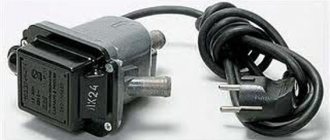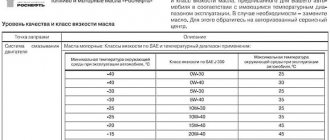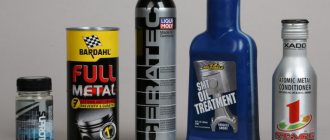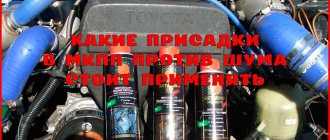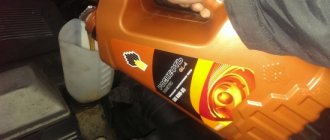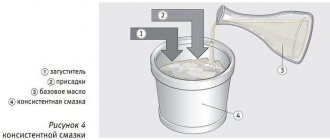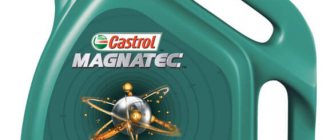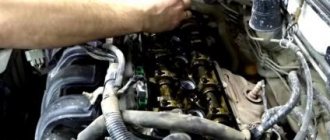You can argue endlessly about whether it is worth or not to use car additives. Visual experiments and tests show that there is practically no point in using additives in the first 5 years of vehicle operation. During this period, the machine and its systems are in excellent condition, everything is perfectly ground together, there are no obvious signs of wear, oxidation, scuffing or other similar phenomena.
Suprotec Active Plus Diesel
After 5 years of operation, the engine begins to show the first signs of obvious wear. They are not so significant and destructive for the internal combustion engine, but if you do nothing and do not carry out any preventive work, the life of the engine will be significantly reduced.
One of the solutions was modern and effective additives. Moreover, it is important to understand that the main characteristic of the best engine additives is their performance, the ability to really help and improve the condition of the power plant. The problem with many additives is the lack of effect. This is just a marketing ploy aimed purely at making money for the manufacturer. But there are also really effective additives, which are included in the current rating of the best additives for engine oil and the fuel system.
Are additives needed for automobile oil at all?
Many skeptical car enthusiasts argue that oil additives are not needed at all - this is nothing more than an attempt by automotive chemical manufacturers to expand their range and increase the profitability of companies. They have one argument: motor oil is a composition that initially contains all the necessary components for the normal operation of a car engine.
It is difficult to argue with this, but precisely in the case when we are talking about normal operation, and not about the situation in which most cars are used in the urban cycle.
Firstly
, not everyone conscientiously warms up the engine before driving. We’re late for work, there’s no time to warm up, we have to hurry... and okay, once we can drive with a not warmed up or not fully warmed up engine. Common situation?
Secondly
, the oil should be changed after 15 thousand kilometers. And everything would be fine, but look at the kilometers traveled when we are talking about the urban cycle: an hour’s journey to work, an hour’s journey back, and the mileage is only 50 km. And people come to change the oil “based on the odometer,” and not based on engine hours. One can only imagine what an amazing composition of waste substances is obtained in the engine by the time the oil is changed.
It would seem that the simplest solution is to state in the technical documentation that the oil needs to be changed more often. But not a single manufacturer will agree to this, since economically this is fraught with the loss of customers and, consequently, a decrease in profits. And this is where oil additives come into the picture.
Initially, such additives were advertised as a way to extend the life of an old, problematic engine. But now we are talking about the fact that new cars also need such a “magic” additive. It is extremely important for the car owner to know exactly what composition he is pouring into the engine, whether this composition is safe and whether there is any benefit from it, and whether money is being thrown away.
Oil and additives
Every motorist knows the rule that factory-made motor oils are not recommended to be mixed with other substances. Because they already contain many useful additives, and working with other components can negatively affect the operation of the internal combustion engine, as the composition of the lubricant will change. Employees of automobile companies claim that all substances are different from each other, which causes incorrect functioning of the engine.
The main problem is that car oil is an engine additive. Which has similar characteristics to the specialized supplements sold. Of course, not all manufacturers of these substances will disclose such information. In addition, some position their product as a balanced product that is suitable for working together with the factory fluid.
The best automotive additives used in fuel
ER
This additive is very popular in Japan among companies that trade used cars. It was studied in many laboratories around the world, after which it was concluded that its use is highly effective. It reduces the friction of steel parts against each other, thanks to properties that condense the metal.
Manufacturers claim that it increases engine power and accelerates torque, while reducing fuel consumption. Many user reviews say that the use of this additive in old cars is almost a miracle. It increases the period between oil changes, and the engine starts to run much quieter. It is necessary to pour this additive into the oil precisely during its replacement, since when added directly to the engine the effect does not appear.
The main advantages of the additive, which we identified based on reviews from satisfied customers, are as follows:
- Increases engine power;
- Increase in torque;
- Saves oil consumption;
- Low cost.
Minuses:
- Not suitable for all cars.
Liqui Moly Speed Tec
This additive is intended for gasoline. It increases power several times and increases torque of any engines running on it. Due to the fact that it does not contain any components containing metal, it is a harmless product for the engine.
The additive acts very quickly, improving the fuel, due to which gasoline combustion occurs at the same temperature in the combustion chamber. As a result, the engine power increases. The volume of one bottle of this product is enough for a full tank of 65+ liters. In addition, some users of this product, judging by their reviews, use it as additional protection for the engine system from various forms of corrosion in the event of vehicle downtime.
The main advantages of this product, based on reviews from satisfied customers, are as follows:
- There are no compounds containing metal;
- The movement of the car becomes smoother;
- The intake system is cleaned;
- Increase in torque.
Minuses:
- This product will only be effective when paired with low-quality fuel.
Castrol TDA
This product, intended for diesel fuel, acts quite comprehensively and multifunctionally. The corrosion process slows down quite significantly, the lubricating properties of the fuel improve, and the oxidation that occurs during engine operation is reduced. But that’s not all, the product reduces or completely eliminates all the negative effects on car parts that are caused by sulfur compounds. All these actions occur without changing the viscosity and density of diesel fuel.
This product can be used in any season, but it works best in winter. This is when it eases the load on the engine the most, making a cold start possible. Another plus in favor of the additive is that it was placed in second place in the test of products by the magazine “Behind the wheel”.
Based on many positive customer reviews, it has the following positive qualities:
- Optimization of the engine operation process in winter;
- No effect on diesel viscosity;
- Prevents corrosion;
- Improved lubricating properties.
Negative:
- At other times of the year, except in winter, its use is not so effective.
Purpose
The additive is a product that is poured into the engine through fuel or lubricant. This action allows the main parts to serve beyond the established period. Today you can find hundreds of types of different additives, which can be either universal or suitable only for a specific model. Auto repair shops recommend purchasing anti-smoke or cleaning agents, but anti-wear and restorative additives are also suitable.
Most additives allow you to reduce fuel costs and restore normal operation and increase power to factory values. It is important to understand that additives are classified according to the method of application.
When a person uses additives in gasoline or diesel, they help reduce fuel costs. Due to the fact that the composition contains components that help improve the octane index and remove excess condensate, performance characteristics are improved. The additive enters the combustion chamber and cleans the insides, which extends the service life of the vehicle.
To completely restore proper operation, the additive is poured along with the engine oil. The active ingredients in the composition help remove accumulated carbon deposits, resins and other contaminants. The additive helps reduce friction between contacting elements. This has a positive effect on strength and increases wear resistance, and the engine starts to work like new.
Additive manufacturers recommend pouring the substance into the engine to prevent rubbing of spare parts in a new or used car. The elements contained in the liquid restore the protective coating on worn elements. This action can extend the service life of pistons and cylinders.
The best additives for cleaning the fuel system of a gasoline engine
This group of additives affects the entire system, cleaning from the fuel tank to the injectors. In this case, carbon deposits are removed from the surfaces of the combustion chamber and other elements.
Suprotec Active Plus
It is used for any gasoline and gas engines (including forced and turbocharged ones) with a mileage of over 50 thousand kilometers, that is, those that have been fully run-in. The average cost of one 90 ml bottle is 1,400 rubles. One bottle is enough for one stage of engine treatment with an oil volume of up to 5 liters. For engines with an oil volume of up to 10 liters, 2 bottles are required. For normal processing in 3 stages, 3 or 6 bottles of the product are needed, depending on the engine size. Detailed instructions are provided on the official website.
Suprotec Active Plus
Feasibility of application
So, we found out that additives to reduce oil consumption create a certain layer on the internal surfaces of the engine that restores the dimensions of the parts and reduces the gap between them.
In addition, additives make engine oil thicker and reduce its flammability. That is, they perform their tasks, but there is no benefit for the engine.
A car engine is a very complex mechanism. During its development, great attention is paid to the size of the gaps, temperature conditions, etc. For this reason, each powertrain manufacturer recommends the use of strictly limited groups of motor oils that meet certain standards and tolerances.
Any additives to the oil inevitably change its composition. Moreover, their components react with additives contained in the oil itself. It is quite logical to draw the following conclusions:
- Additives can, to a greater or lesser extent, solve the problem of increased oil consumption and engine smoke.
- The positive effect is temporary and not always complete, while the consequences for the engine cannot be predicted
Thus, the use of additives is fully justified only if the car owner does not initially plan to repair the engine. Additives will allow you to operate the car for some time. While the additives are in effect, there will be no need to fill in the recommended oil and regularly replenish its level.
Rating categories
It is difficult to say unequivocally which additive will be better and more effective for a specific engine and a specific situation. It all depends on the problems with the engine, as well as the needs of the motorist himself. Some people are concerned about scuffing, others are interested in the issue of increasing the viscosity of the engine oil. Still others seek to reduce the level of exhaust smoke altogether. There really are a lot of options.
To form the final rating, which included only those engine additives that work better and give a positive effect, the list was divided into several subcategories. Each of them had its own leaders.
The rating subcategories are made up of:
- the best restorative additives;
- the best anti-smoke additives;
- the best means to increase engine compression;
- the best additives for diesel internal combustion engines.
This division will allow you to find out which additive added to the oil will be the best for your gasoline engine, or which additive is the best if you have a diesel engine at your disposal. All additives have undergone real tests and have proven their effectiveness in practice.
Restorative additives
First, let's look at the best additives designed to restore the engine. In most cases, such fluids are intended to be added specifically to the engine oil, and not to the fuel tank. Although there are rare exceptions.
Before naming the most effective additives for engine restoration, you need to understand their essence and purpose. Such auto chemicals are aimed at coping with accumulated dirt, carbon deposits and resin deposits that gradually form on the internal surfaces of the internal combustion engine.
Regular and correct use of such products can increase the service life of the engine, increase its service life, delay the need for major repairs, and also reduce engine oil consumption. These are objectively the best additives designed for high mileage engines. But you shouldn’t rely on a bottle of chemical if the engine is in a dying state.
Restoring an internal combustion engine using additives has a number of positive aspects. There is no need to contact a car service, and the cost of the product is small. Just read the instructions carefully and add exactly as much liquid as indicated by the manufacturer. Otherwise, you risk significantly changing the chemical composition of the engine oil, which will ultimately have the opposite effect.
Now let's look at the top of the restoring additives intended for pouring into the engine.
FN710 from Fenom
It is a repair and restoration additive, which is available in a small bottle for one-time use. An organometallic compound is added to engine oil and serves to protect against wear. Restores performance characteristics and can be used for diesel and gasoline power units.
Fenom FN710
Tests have shown the ability to eliminate microdefects on the friction surfaces of internal moving engine parts. Increases resistance to wear of internal combustion engine elements. Helps the engine better cope with overloads and oil starvation. It also reduces mechanical losses and has a positive effect on fuel and oil consumption. The product can correct compression inside the cylinders.
As the manufacturer himself states, its additive interacts with various contaminants at the molecular level. Helps provide protection against further accumulation of soot and deposits.
CeraTec by Liqui Moly
It’s not often that motorists come across truly effective additives. But there are some. And if we talk about the most effective and useful additives intended for engine restoration, we must definitely mention the CeraTec product produced by a well-known manufacturer, Liqui Moly.
Liqui Moly CeraTec
In many ways a universal remedy. It can be used to prevent contamination of internal surfaces on a new engine. The substance also copes well with already accumulated deposits on engines with high mileage. Many people recommend adding such an additive during the engine break-in period after a major overhaul.
The restorative properties are due to the presence of microceramic substances in the composition. They fill microcracks in the engine, create a perfectly flat and smooth surface, ensuring optimal movement of the pistons and other moving components of the internal combustion engine. Moreover, the resulting protective layer is characterized by increased strength, which allows you to protect the motor from overloads.
If you don't know which additive is safer and better to put in your engine, given the type of oil you use, choose CeraTec without any worries. This substance is mixed with all types of motor oils. The additive does not form sediment and does not clog filters. Based on the test results, it was found that the effectiveness of the additive can be maintained for 40-50 thousand kilometers.
Off Road Gearbox from Suprotec
In the current rating of additives intended for engines with high mileage and for restoring internal surfaces, it is worth including the domestic development from the company Suprotec. A truly effective and high-quality additive based on a tribotechnical composition.
Suprotec Off Road
What kind of engine additives are there?
The additive is one of the ways to increase engine power. Thanks to the wide range of reductants available at specialized points of sale of auto products (shops, markets, service stations), it is difficult for the driver to decide on the choice of cleaning agent. There can be several reasons for engine oil consumption. These are deformation of the cylinders, worn piston rings, insufficient viscosity of the engine oil, engine overload and many others. But common ones are clogged oil and excessive wear of rubbing surfaces. To eliminate them, various restoring liquids are used, which are added to the lubricant.
However, the popularity of additives entails the production and sale of low-quality products, which can harm the efficient operation of the car. Therefore, it would be a good idea to familiarize yourself with the main functions of additives and find out their pros and cons.
Remetallizant substances
The additives contain particles of soft metals (copper, bronze, tin), which help create a protective layer under mechanical stress. Such products include products from such manufacturers as Rimet, SURM, Resurs, Fenom, MS-1000.
The positive factors of reducing agents are:
Improved compression in cylinders;
· reduction of consumption of fuels and lubricants;
· the protective layer is formed quite quickly;
· low cost of the product, especially domestic production.
Flaws:
· the protective film has low wear resistance;
· for high-quality engine operation, it is necessary that the oil always contains a remetallic agent;
· when replacing the lubricant, the further effectiveness of protection decreases sharply;
· the result from using the additive may be unstable and may not meet the wishes of the car owner.
Teflon-containing preparations
Created on the basis of Teflon and ensure the creation of a protective layer on the surface of rubbing parts. Teflon is a rather slippery substance, and the film formed on the surface acts as a heat insulator, which negatively affects the removal of heat from friction points. Therefore, there is no clear idea of how the drug will behave in a particular car.
Negative aspects of the additive:
· high cost of the product;
· mandatory use after changing the oil in the system;
· fragility of the protective layer;
· “does not like” high temperatures, is susceptible to decomposition;
· when filling once, requires constant presence in the oil system;
· the presence of Teflon negatively affects exhaust gas performance. The concentration of phosgene increases sharply. The use of the drug is limited in Western Europe, Canada and the USA;
· entails coking of the pistons and the appearance of carbon deposits on the walls of the combustion chamber.
The following companies are involved in the creation of Teflon-containing preparations: Lubrilon, Liquid Ring, Matrix, Slick 50, Petrolon, Microlon.
Metal conditioners
The molecular structure of the substance includes chlorine and sulfur compounds, which accelerate the process of dissolving wear products of metal surfaces, turning them into salt. Next, the part is restored by returning the salt to the metal surface. Due to the fluorinated polyesters contained in the additive, the rubbing mechanical parts are cladding. To prevent polymers from contributing to the formation of carbon deposits in the combustion chamber, cleaning elements (alcohols, ethers) are added to the reducing agent.
Advantages:
· sharply reduces engine wear;
· high cladding of contacting surfaces.
Flaws:
· toxic and banned in some European countries;
· the protective layer is destroyed when exposed to high temperatures in the combustion chamber;
· Requires constant presence in engine oil.
Companies producing similar drugs: Fenom, SMT2, Hi-Gear, Xado, ER.
Layered Friction Modifiers
The drug is produced on the basis of particles of graphite, tungsten, molybdenum, due to which a protective surface is formed in several layers. Such additives have more negative aspects than positive ones:
· unstable protective ability of the layer
· fragile coating loses its qualities at low concentration of the product in the oil system
· has a high rate of destruction of the protective film when exposed to high temperatures
· graphite particles contribute to the formation of unwanted deposits on the walls of the combustion chamber, pistons and valves.
Companies producing such additives: Liqui Moly, Xenum.
Friction geomodifiers
These additives contain serpentine, which includes various chemical elements (magnesium, graphite, amphibole and forsterite). The compound tends to emit high temperatures when friction occurs. The metal becomes softer and microparticles of chemical elements are introduced into it, forming a metal-mineral structure. The protective layer is characterized by increased strength and abrasion resistance.
Other advantages:
· the protective cover is similar in structure to a metal surface;
· with a sharp change in temperature from “plus” to “minus”, the resulting film does not chip;
· the duty cycle of engine oil increases, eliminating its rapid production;
· acts as a dielectric, wear-resistant;
· not affected by corrosion and oxidative processes;
· allows you to renew the worn surface of parts and improve its efficiency.
Disadvantages of geomodifier:
· does not work on engines with aluminum liners.
Produced by manufacturers Suprotek, Forsan, Rys-Master. They are considered the best additives for high mileage engines.
Some features of the use of regenerating agents for gasoline and diesel engines:
· on diesel engines, additives can increase the flammability characteristics of the fuel and reduce the likelihood of deposits appearing in the cylinders;
· increases resistance to detonation of gasoline engines.
The secret of the composition: the manufacturer’s “trick” and the buyer’s risk
Unfortunately, manufacturers of automotive chemicals are in no hurry to reveal their secrets and inform the consumer about what exactly is included in their additives. It turns out to be a rather unpleasant thing: the same drugs must have a description indicating the elements included in the composition, and in the case of oil additives, the manufacturer makes this composition a secret “trick”, inviting the buyer to take his word for it.
Adding an additive to oil can lead to a variety of consequences for the car. New components can seriously change the characteristics of the oil itself.
Also, do not forget that this composition will be exposed to high temperatures. In the internal combustion chamber of the fuel, the oil “improved” by the additive will be present together with metals, which, as is known from school chemistry courses, can serve as catalysts for the development of various chemical reactions. Therefore, if the composition of the additive is unsuccessful and not well thought out, this can make a motor oil with a modified chemical formula unsuitable for use.
There is only one conclusion - you can use an additive only if it is “tested”, that is, it has a composition that is truly useful and effective. Still, the “secret ingredients” are a pig in a poke and the risk of completely ruining the car’s engine.
Therefore, before buying an additive, you should familiarize yourself with the range, characteristics, composition of the product and reviews from motorists - this is the only way to be safe in case of a poor-quality composition.
Benefits and harms for the engine from using additives in the engine to reduce oil consumption
Let's start with the positive aspects. It has been repeatedly tested and proven that engine additives are capable of protecting the engine from wear for some time, that is, creating that same protective layer.
- The additive can be used if there is a critical drop in the oil level without the possibility of topping up or stopping the car (for example, the oil pan was broken on the highway and you need to get to a nearby car service station under your own power).
- Also, in some cases, an engine additive can extend the life of an old, worn-out engine, which is almost impossible to operate normally without repair. To put it simply, the additive allows you to delay the time before major repairs, while at the same time allowing the owner not to add about 0.5-1.0 liters of oil every 100-200 km. mileage, switch to cheaper oil and thereby save money.
Now let's focus on the cons. The most important disadvantage of using additives to reduce oil consumption is the short-term (often very short-term) positive effect, as well as unpredictable consequences for the internal combustion engine after using such compounds. The latter become obvious after opening the engine for a major engine overhaul.
- auto mechanics note that after using anti-wear additives, the “insides” of the engine are often covered with a certain layer, which is extremely difficult (and sometimes even impossible) to wash.
- There are individual statements that after using certain compounds, parts cannot be restored (grinding, boring, etc.) during engine repairs. This means that such elements (often expensive) require mandatory replacement.
- Repairing an engine that regularly uses protective solutions or additives to reduce oil consumption typically costs 20-50% more than engines that do not use these compounds.
Additive categories
Depending on the purposes for which the engine additive is used, the following categories can be distinguished:
Anti-knock (correcting octane and cetane numbers)
If the quality of gasoline is poor, peroxides appear in the fuel mixture, which are dangerous because they burn before combustion of the fuel mixture begins. As a result, the temperature in the combustion chamber rises to critical levels, which leads to engine detonation, and anti-knock additives prevent engine detonation by destroying peroxides and preventing them from accumulating.
Depressants and dispersants
Depressant additives lower the temperature threshold at which the oil begins to solidify. Mostly they are poured into the engine with winter motor oil, but there are diesel additives that are added to the car’s fuel tank, which prevents the fuel from solidifying. Dispersants, in turn, are poured only into the tank and prevent stratification of diesel fuel and prevent the formation of paraffin deposits. Depressant additives
Viscosity-increasing oils (thickeners)
Used to increase viscosity. The fact is that during operation of the engine, some parts of which are susceptible to friction, wear out, for example, components of the cylinder-piston group, which leads to an increase in the gaps between them. Because of this, oil enters the combustion chamber and smoke appears while the engine is running. It is the use of these additional substances that increases the viscosity of the oil and prevents it from entering the combustion chamber.
With anti-friction coating
They are used to prevent the appearance of scuffs on the cylinder walls of an internal combustion engine and to reduce the gaps between rubbing pairs. It also reduces noise during engine operation and reduces the amount of toxic substances in exhaust gases. In addition, these compounds trigger the “wearlessness” process, discovered quite a long time ago by Russian tribologists and called the Gorkunov effect. In other words, the chemistry acting on the surfaces converts wear products into an ionic state and then deposits them again in wear zones.
Preventing the oxidation process (inhibitors)
Protective additives that are used to prevent corrosion of metals that come into direct contact with fuel. This additive displaces the water film from the metal surface, thereby preventing the metal from oxidizing.
Car additive test
In order to test additives, we need a solution that will match the engine and fuel of a particular car. And an important precious parameter is time. Then everything is very simple. Take the liquid and first read the instructions. Pour the contents into the engine or fuel tank. Next, take motor oil or fuel, depending on the task at hand, and pour it into a jar. Shake the can and repeat the previous steps again. We do it a second time to capture all the remaining beneficial liquid. You can do it three times, it won’t get any worse.
Testing was carried out on Liqui Moly Mos2 Additiv. This is an anti-friction additive for motor oil with molybdenum disulfide. It is added in an amount of 3–5% to engine oil for all gasoline and diesel engines, according to the instructions. Liqui Moly Mos2 Additiv is based on molybdenum disulfide (MoS2). After we used it, a film appeared on all friction surfaces. It is resistant to heavy loads. The film significantly reduces friction and makes all moving parts easier to move.
Thus, we notice the following benefits: reduced fuel and oil consumption, as well as fewer breakdowns. The additive does not precipitate and does not clog the pores of the oil filter, oil channels and hydraulic compensator channels. Tested on turbo engines and catalysts. Laboratory research showed us interesting results. The Liqui Moly Mos2 Additiv antifriction additive contains microelements: calcium Ca - 6 mg/kg, magnesium Mg - 0 mg/kg, boron B - 0 mg/kg, zinc Zn - 4 mg/kg and phosphorus P - 0 mg/kg and molybdenum Mo – 10885 mg/kg. These indicators indicate that the antifriction additive contains a shock dose of molybdenum disulfide, the task of which is to create a protective layer in friction pairs.
Varieties, mechanism of action and functions performed
The main purpose of using triboid compounds is to increase engine performance and reduce unproductive losses. Such losses include pumping losses and losses to overcome friction forces in the engine.
The work of the tribo composition is aimed at reducing the coefficient of friction, as a result of which scratches are removed from the surface of the internal combustion engine, engine power and dynamics increase, and fuel and oil consumption decreases.
If, as a result of using an additive to restore the performance of an internal combustion engine, you have achieved a similar effect, this is undoubtedly the best additive for the engine.
The mechanisms of operation of tribo compounds depend on the main active component; they are divided into the following groups:
- cladding with layered modifiers or polymers;
- metal cladding compositions;
- micro-grinding with mineral powders.
In addition, additives for restoring internal combustion engines can be divided into several groups according to their functional characteristics:
- Compositions that increase octane number and eliminate peroxides.
- Additives that prevent oil from solidifying at extremely low temperatures (depressant).
- Metal (surface) conditioners. These are auto chemical products, the main components of which are chemically active, aggressive substances. The main property is the anti-scuff effect, the creation of a protective microfilm from stable polymer and polyester structures, reducing the coefficient of friction under conditions of high specific loads and sliding speeds, especially in conditions of high humidity.
- Viscosity modifiers. The main effect of these tribo compounds is to reduce and adapt the viscosity index of motor oil under engine overloads.
- Antifriction additives. The operating principle is based on the creation of a protective enveloping layer on the surface of parts from remetallizing components included in the structure of the additive.
The tribocomposition, in accordance with the manufacturer’s recommendations, is usually added to the engine oil in the required proportions.
The most common additives for improving engine performance are anti-friction compounds and viscosity modifiers. To complete the picture, we will consider and test similar engine additives from well-known manufacturers:
Anti-friction
LIQUI MOLY Oil Additive
Oil Additiv refers to anti-friction compounds based on molybdenum disulfide (MoS2). The German company Liqui Moly has been on the market of auto chemicals and motor oils for more than a decade; it is rightfully considered one of the leaders in this segment. All of the company's products have approvals and certifications from the world's largest automakers.
Particular attention is paid to compliance with the requirements of DEKRA and the German Technical Supervision Authority. A distinctive feature of the original Liqui Moly auto chemicals is that the products are packaged only in Germany (plant in Ulm).
In theory
The additive refers to compositions that work on the principle of cladding with layered modifiers or polymers. The main goal is to reduce the coefficient of friction and remove deposits in friction zones. The result is improved mobility of the piston rings and a tighter fit to the cylinder bore.
The manufacturer promises the following results when using Oil Additiv:
- interaction with all types of motor oils;
- stable operation of the internal combustion engine in extreme conditions;
- removal of existing deposits, prevention of new ones;
- restoration of worn engine parts, preventing further damage;
- reduction of fuel and oil consumption;
On practice
Reviews from consumers and professional auto repairmen about the LIQUI MOLY Oil Additiv engine restoration additive are mostly (about 80%) positive. Many people note a real reduction in oil consumption; if fuel consumption is reduced, it is very slight - no more than 5%.
The additive copes well with its main task - reducing friction and removing scratches on the working surface of a worn engine (according to testing results, the coefficient decreased by almost 2 times), accordingly, the engine's operating life is significantly increased.
Step Up SP2255 Polyphlon Motor Protection
The manufacturer of this triboid composition is an American company with the promising name Step Up. Step Up has been known on the global auto chemical market for quite some time; it appeared on the domestic market in the early 2000s.
In theory
The main difference from similarly acting additives is the multicomponent composition of Step Up SP2255 Polyflon, the main part of which is activated Teflon particles interacting with a complex of antioxidants, stabilizers and reducing agents.
The operating principle is the same as the previous additive - i.e. penetration into damaged surface layers of internal combustion engine components, removing microchips and reducing the coefficient of friction.
Only Teflon acts as the active ingredient here. According to the manufacturer, as a result of using Step Up SP2255 Polyflon, the following results can be achieved:
- Restoring operating characteristics of oil pressure and compression;
- Facilitation of engine starting at sub-zero temperatures;
- Long-term performance of the additive even after an oil change;
- Compatible with all types of motor oils and auto chemicals;
- Increasing engine life due to the formation of a super-strong film with a sliding effect on the outer layer of parts.
On practice
Despite the loud name, the American company did not manage to go far in Russia; moreover, many of our car enthusiasts would be happy to give it a new name - Step Back. A very ambiguous attitude towards the work of this additive was expressed in only 20% of positive reviews about it.
The remaining 80% of car enthusiasts speak negatively about the results obtained, of which 30% note the negative consequences of using Step Up SP2255 Polyflon, and the remaining half regret wasting money without feeling any effect. Well, as they say, it remains to be seen who is luckier...
Professional auto repairmen are also skeptical; what is especially alarming is the absence of an official English-language (American) website for the manufacturer; even such large trading platforms as EXIST and EMEX provide absolutely no information about this manufacturer, modestly indicating “made in the USA.”
However, on American Internet resources there was no mention of the company Step Up, much less the composition or testing of its auto chemicals.
VMP AUTO iMAGNET P14
This triboid composition is an invention of the Russian research and production company VMPAUTO. Own developments of innovative lubricants allowed the manufacturer to become on par with recognized leaders in the field of production of NLGI greases.
The company owns laboratories and research and production centers with unique equipment, the likes of which there are no more than ten in the world.
VMPAUTO works closely with the St. Petersburg Polytechnic University, whose technology department conducts testing and confirms the effectiveness of the company’s developments.
In theory
The fundamental principle of operation and the main effect of iMAGNET P14, the manufacturer positioned the optimal viscosity range of the engine oil after using the additive. The components of this tribo composition are Japanese polymers, Belgian synthetic oils and German antifriction additives.
Combined in certain proportions and processed using innovative technologies, all these components are combined into a composition that interacts with oils classified as W-16, W-20, W30 A5 C3, etc.
These are oils with low viscosity and ash content with high performance. They have undeniable advantages - increased engine dynamics and power, increased environmental friendliness, and increased reliability.
However, they have a significant drawback - they are designed to be replaced after a mileage of only 3,000 km and are very susceptible to destruction when exposed to low-quality fuel.
It is these problems that the use of iMagnet P14 solves - due to the formation of a thin but durable oil film formed when using the additive, the engine is protected from the effects of negative factors that arise during extreme engine operation, turbine overheating, dilution with low-quality fuel, etc.
On practice
Many car owners recognize the effectiveness of the iMagnet P14. Among the noted advantages are an increase in acceleration dynamics and a decrease in oil consumption. Experts share the same opinion - based on the tests carried out and reviews from many auto experts, we can conclude that the additive really works.
Confidence is derived from the presence of our own laboratory, constant testing of products by the manufacturer and certification according to the ISO-9001:2008 quality system.
The disadvantages of many include the high cost of the product - the price of several tubes of the additive is comparable to a full replacement of good synthetic oil.
Bullsone Engine Coating Treatment BSPW (10625901)
This additive was developed by the South Korean company Bullsone, which operates under the slogan “Love My Car”.
Bullsone has been producing professional auto care products since 2001, and during this time it has achieved a lot. Thanks to its own research and production complexes, an innovative approach to development, the use of the latest technological solutions, environmentally friendly production and a skillful marketing policy, the company has achieved the presence of almost its entire product line in the premium segment of auto cosmetics and auto chemicals.
In theory
Bullsone Engine Coating Treatment BSPW creates a specially formulated AOMC (organic molybdenum compound) layer that remains on the friction surfaces of the vehicle engine. AOMC is a joint development of US and Japanese scientists for use in the space industry.
It forms a protective film on the surface of internal combustion engine parts, which leads to wear protection during dry and cold starts, restores fuel efficiency and extends engine life.
Due to its multicomponent composition, the additive significantly reduces friction; the use of the properties of the Fullerene effect provides exceptional protection against engine wear. This invention (“nano fullerene” or “bearing effect”) was awarded the Nobel Prize in Chemistry and is widely used in various branches of modern industry.
The advantages of the composition declared by the manufacturer include an increase in the response rate to acceleration (increased dynamics during acceleration), a decrease in the noise level of the internal combustion engine, and restoration of fuel efficiency.
On practice
Bullsone Engine Coating Treatment BSPW is not widely used in Russia, although testing conducted by auto experts confirms some effectiveness of its use. This mainly concerns the reduction in friction coefficient compared to using inexpensive synthetic oil.
The additive has almost no practical application - low sales level. But based on the few reviews from car owners, we can conclude that the main effect of Bullsone Engine Coating Treatment BSPW noted by them is a reduction in engine noise.
The disadvantages include the short-term effect of the additive (contrary to the resource declared by the manufacturer for 10,000 km, in reality its operating torque was only sufficient for 2,000 km). In addition, consumers note the high cost and, despite their rarity on sale, the possibility of counterfeit.
Tribogreen Epilam Triboconcentrate ICE trucks
The manufacturer of this triboid composition is the Russian research and production association "EPILAM", whose specialization is the scientific development and production of lubricant products that act by reducing the coefficient of friction in internal combustion engine components using nanotechnology.
NPO Epilam has its own laboratory and production centers, participates in international exhibitions and conferences, and has several times been among the top three in the categories “Innovation activities: R&D, new products” and “VEB innovations”.
In theory
Tribogreen Epilam Triboconcentrate ICE refers to metal conditioners, the main mechanism of operation of which is cladding with layered modifiers or polymers.
The additive formulas for the TRIBOGREEN Epilam Triboconcentrate ICE additive for trucks are based on an innovative complex of nanoparticles that reduces friction and wear, providing excellent protection for lubricated parts.
The manufacturer promises that by adding unique additives and components to the additive, the mileage, service life of the internal combustion engine and oil drain intervals will be significantly increased, as well as the sticking, noise level and operating temperature will be reduced.
The additive contains fluoropolymer structures, corrosion inhibitors, surfactants and other components. The triboid composition has an anti-scuff property, which is formed as a result of polymer-containing additives reacting with the surface of parts of internal combustion engine components. The presence of epilam and fluorine reduces friction and increases the resistance of worn parts to extremely high and low temperatures.
On practice
This product is not widely used in the automotive chemicals and cosmetics market. There may be several reasons for this:
- very high price (from 5,700 rubles per 200 ml bottle);
- lack of advertising campaigns and promotions.
Perhaps this is a temporary phenomenon, since the product has not been on sale for very long and simply has not had time to prove itself.
However, at the moment there is a lack of practical use and consumer reviews, although the recommendations of specialists based on the tests and tests of TRIBOGREEN Epilam Triboconcentrate ICE (for a diesel engine) indicate a positive result of using the additive.
When you can’t do without engine additives
Unfortunately, a significant part of the domestic car fleet are older cars, which, it is possible, were driven by people the same age as the grandfathers of today’s drivers. It is clear that to call the condition of most components and assemblies of such vehicles ideal would be too presumptuous. Oil additives allow you to extend the life of the power units of such “oldies”. And although we are not talking about a complete restoration of youth, a few extra thousand (or even tens of thousands) kilometers are quite a tangible amount, for which one can and should fight.
So if you feel that your car’s engine is about to “give up” (and signs of its imminent demise may include a significant decrease in compression, an exorbitant “glutton” of oil and an increased appetite for fuel) - instead of costly overhauls, you should try using the latest technical fluids . Additives, when added to motor oil, will help to significantly extend the life of the power unit - according to some reports, up to 50 thousand extra kilometers.
The only advice is that you should not use them on a regular basis: while cleaning some nodes, they clog others. But as a preventive and therapeutic (short-acting) agent, they are irreplaceable, so it is recommended that they be used once between routine lubricant changes.
